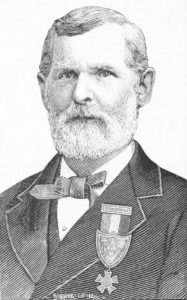How To Name a Killer National Park – Yosemite
Imagine you are charged with naming the crown jewel of the national park system. Reasonably, you want to honor the Native Americans who once lived there. You decide to focus on something for which these First Nations people were famous. Therefore, you decide to call this park “The Killers.”
Wait, what? No. That’s an outrage. There would be protests, and calls for a congressional investigation. Well, social justice warriors, get your vitriolic pens ready:
Dear <insert local representative>, I would like to call your attention to the completely inappropriate and offensively named Yosemite National Park.
How exactly did this happen? And why have I never heard about it before?
The story you may have heard is that the valley was named Yosemite (meaning Grizzly Bear) in 1851 by Bunnell of the Mariposa Battalion. Bunnell simply wanted to honor the native people in the valley, as he was driving them off their land forever. Bunnell wrote, in Discovery of the Yosemite (1892):
… it would be better to give it an Indian name than to import a strange and inexpressive one; that the name of the tribe who had occupied it, would be more appropriate than any I had heard suggested.” I then proposed “that we give the valley the name of Yo-sem-i-ty, as it was suggestive, euphonious, and certainly American; that by so doing, the name of the tribe of Indians which we met leaving their homes in this valley, perhaps never to return, would be perpetuated.”

Apparently, neither Bunnell nor his Commander Major James Savage paid close attention during their Miwok as a second language class. According to language experts, they seem to have confused two similar terms. The incorrect Miwok term, isumat i, does in fact mean grizzly bear. Unfortunately, according to Daniel E Anderson in Origin of The Word Yosemite:
… Yosemite means literally “those who kill” (Yos, “to kill,” the modifier e, “one who,” and the plural suffix -meti). It was used by the surrounding Miwok tribes. The Yosemite people were referred to as killers by these surrounding tribes, who feared them. The Yosemite tribe, led by Chief Tenaya, were composed of renegades from multiple tribes, including Mono Paiute from the eastern Sierra. The Paiute were traditional enemies of the more-peaceful Miwok people.
Uh-oh. Yosemite National Park Public Relations, this is Huston… we have a problem. That national park we named Grizzly… well it is actually a bit more grizzly than we thought.
Very well intended people must have struggled mightily about what to do. I’m not sure, but the large inventory of Yosemite T-shirts and coffee mugs may have influenced the final decision. If you happen to be on the Yosemite National Park official website and search for “the killers” or “those who kill”… you will find nothing. In fact, there does not appear to be any reference at all to what Yosemite actually means.
Unfortunately for Bunnell and Savage, their naming blunders did not end there. In Discovery of the Yosemite (1892), Bunnell wrote:
I made every effort to ascertain the signification of Ah-wah-ne, but could never fully satisfy myself, as I received different interpretations at different times. In endeavoring to ascertain from Ten-ie-ya his explanation of the name, he, by the motion of his hands, indicated depth, while trying to illustrate the name, at the same time plucking grass which he held up before me. From these “signs” I inferred that it must mean the deep grassy valley.
However,according to Daniel E Anderson in Origin of The Word Yosemite:
The Yosemite people called Yosemite Valley Awooni or Owwoni for (gaping) “large mouth,” where the stem Awo or Owwomeans “mouth” and the suffix ni means “large.”
So let me get this straight: Yosemite means “those who kill” and Ahwahnee means “big mouth.” Is it possible that all National Park names have hidden derogatory meaning? How do we know that Glacier doesn’t refer to “obese, slow moving, cold people”? Or that Shenandoah doesn’t refer to “those who avoid paying income tax”?
To add insult to injury, the National Park Service remains embroiled in a lawsuit with Delaware North (the former park concessionaire) over park naming rights, including Curry Village, Badger Pass, Wawona Hotel and yes, the most historic hotel: The Ahwahnee. You might think of it simply as the Battle of the Big Mouth.
So, if your kids are less than excited about visiting the Ahwahnee Hotel in Yosemite National Park, you might spice it up with the raw truth:
Hey kids, let’s go find the Big Mouth, in the Valley of the Killers!
Source link





